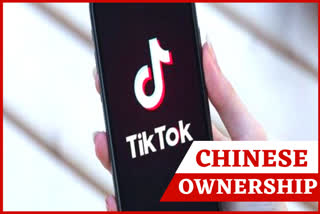New York: The latest twist in the TikTok saga is an especially strange turn in a tale filled with strange turns. Suddenly, Microsoft — known primarily for work software like Windows and Office — is in talks to buy the popular Chinese-owned video app, which has raised national-security concerns for US officials.
It's still unclear what shape such a ban would take or whether the sale will go through. TikTok's users are posting videos saying they are upset and angry. Here's what's at stake.
Q. What is TikTok again?
A. The app is a home for fun, goofy videos that are easy to make and to watch. That's made it immensely popular, particularly with young people, and U.S. tech giants like Facebook and Snapchat see it as a competitive threat. TikTok says it has 100 million U.S. users and hundreds of millions globally. It has its own influencer culture, allowing people to make a living from posting videos on the service, and hosts ads from major U.S. companies.
ByteDance Ltd., a Chinese company, launched TikTok in 2017, then bought Musical.ly, a video service popular with teens in the U.S. and Europe, and combined the two. A twin service, Douyin, is available for Chinese users.
Q. What concerns U.S. officials about the app?
A. TikTok, like most other social networks, collects data about its users and moderates what's posted. It grabs people's locations and messages they send one another, for example, and tracks what people watch in order to know what kinds of videos they like and how best to target ads to them.
Similar behaviour has raised concerns about American social networks, but Chinese ownership adds an additional wrinkle because the Chinese government can demand that companies help it gather intelligence. In the case of TikTok, this remains a hypothetical threat, said Samm Sacks, a researcher at Yale Law School's Paul Tsai China Center — but it could be happening.
Read also:TikTok could become a 100% American company, as per Larry Kudlow, Trump Adviser
TikTok has vowed that U.S. user data is not stored in China and that it would not hand over user data to the government. But experts have said that if the Chinese government wants information, it will get it. The U.S. government has also cracked down on Chinese telecom companies Huawei and ZTE because of this worry. The companies deny that they facilitate spying.
There are also concerns about TikTok censoring videos critical of China, which TikTok denies, or pushing propaganda. Advocates in the U.S. also say the company is violating children's privacy laws.
Read also:Government of India bans 59 mobile apps including Tik Tok, UC Browser
Q. Is the threat from TikTok unique?
A. No. China's economic espionage is a well-known threat, and similar user data concerns were raised about Huawei, the telecom equipment maker. The Chinese military or groups with ties to it are accused of massive hacks of sensitive information from credit bureau Equifax and the federal Office of Personnel Management.
But several experts say that the U.S. government is lashing out at Chinese tech companies without taking significant steps to protect Americans' privacy with federal legislation and while working to undermine encryption, which allows secure communications that can't be easily read by outsiders.
"We're trying to solve the issue of how you manage all the security risk that comes from massive data collection in an unregulated space, and we're trying to solve it by playing whack-a-mole with different Chinese companies that we see as threats," Sacks said. "We get into dangerous territory where the U.S. government is controlling what Americans can and can't do... This is technonationalism."
